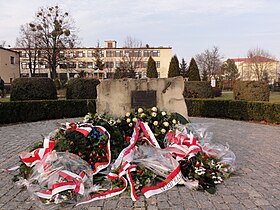
Back Ціхацёмныя Byelorussian Cichociemni BS Cichociemni German Mutobskuruloj Esperanto Cichociemni Spanish Cichociemni Estonian چیخوچیمنی Persian Cichociemni French Cichociemni Italian Cichociemni Polish
| Silent Unseen | |
|---|---|
 Monument to the Silent Unseen in Dębowiec | |
| Active | 16 February 1941 – 27 December 1944 |
| Country | occupied Poland |
| Allegiance | Polish government-in-exile |
| Type | Special operations paratroops [1] |
| Role | Armed forces of Polish Underground State/Polish government-in-exile |
| Engagements | World War II Operation Tempest, Operation Ostra Brama, Lwów Uprising and Warsaw Uprising |
The Silent Unseen (Polish: Cichociemni, Polish pronunciation: [t͡ɕixɔˈt͡ɕɛmɲi]) were elite special-operations paratroopers of the Polish Army in exile, created in Great Britain during World War II to operate in occupied Poland (Cichociemni Spadochroniarze Armii Krajowej).[2]
A total of 2,613 Polish Army soldiers volunteered for training by Polish and British SOE operatives. Only 606 people completed the training, and eventually 316 of them were secretly parachuted into occupied Poland. The first operation ("air bridge", as it was called) took place on 15 February 1941. This operation was conducted by Captain Józef Zabielski, Major Stanisław Krzymowski and political courier Czesław Raczkowski. After 27 December 1944 further operations were discontinued, as by then most of Poland had been occupied by the Red Army.
Of 316 Cichociemni, 103 perished during the war: in combat with the Germans, executed by the Gestapo, or in crashes. A further nine were executed after the war by the Polish People's Republic; the communist regime was hostile to the Cichociemni, considered to be British ideologised infiltrators.[3] Ninety-one Cichociemni operatives took part in the Warsaw Uprising of 1944.
- ^ KubaWinter (2015). "Cichociemni". Sezony operacyjne. Ekipy Spadochronowe. Encyklopedia skoczków AK. Introduction with Index of Individual Subpages. Archived from the original on 2006-02-08. Retrieved 18 October 2015.
- ^ Kazimierz Iranek-Osmecki (pl), The Unseen and Silent: Adventures from the Underground Movement, Narrated by Paratroops of the Polish Home Army, Sheed and Ward, 1954, p. 350.
- ^ Bakare, Lanre (15 February 2021). "Families of Poland's secret army asked to share stories of wartime Britain". The Guardian.